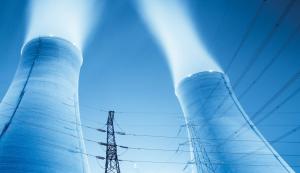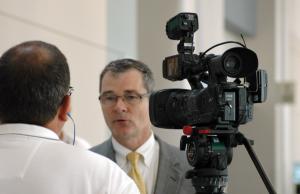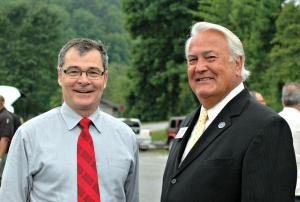Reprocessing nuclear fuel is a sustainable and viable option.
Tim Echols is a commissioner to the Georgia Public Service Commission, first elected in 2010.
As an outspoken energy regulator in a very pro-nuclear power state, I have been somewhat baffled by the lack of support for the reprocessing of spent-nuclear fuel. Why would a country that recycles even the smallest Coke can or cardboard container not be united in reprocessing some of the most toxic material that we produce?

My journey began with my very first meeting of regulatory commissions in 2011 where I attempted to push through a resolution about spent fuel reprocessing. Little did I know the opposition that awaited me - that I had stumbled into some quick sand, and was not even sure why. We had a conference call about the resolution, and it did not even receive a second. The resolution seemed as toxic as the nuclear waste I was talking about.
Maybe that was because I was simply looking at this from only a chemistry perspective. After all, nuclear fuel recycling is simply separating usable materials from non-recyclable end waste, like fission products and minor actinides, through a series of mechanical and chemical processes. The US Department of Energy had done this successfully at the Savannah River Site with government-related waste, so why not allow this to happen on the commercial side?
The answer I later found out was the "P" word: Plutonium. There were policy leaders in the National Association of Regulatory Utility Commissioners, environmental activists and other good people who had grave concerns about plutonium and what might happen to it.
So my next stop was a meeting with a man who led the charge against reprocessing - the former President, Jimmy Carter, in Plains, Georgia. I thought that with all the technology and advancements since his time in office, and with President Obama's firm opposition against Yucca Mountain, surely President Carter's thinking would have evolved. It turns out that it has. He said Obama was wrong to close Yucca Mountain and reprocessing nuclear waste holds promise if done with the same care that the French use.
 Echols spends a lot of time explaining the value of his state's nuclear power to the public.
Echols spends a lot of time explaining the value of his state's nuclear power to the public.
Next, I invited the French General Consul of Atlanta to my office to discuss reprocessing and their concern about non-proliferation. The French assured me they had the same concern as President Carter, but their approach has been consistent-reprocessing nuclear waste is the right thing to do for future generations. Pascal Le Deunff, then Consul General of Atlanta, reminded me of the 1973 oil embargo that brought France to its knees and united the country to be energy independent. Nuclear power would be their means to independence, and they have stuck with it.
The French leader talked about their selective separation allowing the recovery and reuse of 96 percent of the used fuel. It was an optimized ecological solution within the management of nuclear used fuel, and frankly, he couldn't understand why the United States would not follow suit. In fact, a French study showed that replacing the recycling policy with one of disposing used fuel without reprocessing would lower the total cost per kWh by only 1 percent. That sounded like a no-brainer to me, but I was soon to learn that this calculation relied on economies of scale-something the French government could dictate because of their ownership interest in power companies, reactors and the reprocessing plant. In our country, things are much more decentralized.
I made a trip to Charlotte to meet with leaders of the French company, Areva. They talked of France's leadership in recycling with a 1,700-ton annual capacity. They also discussed their advancement in Mixed Oxide Fuel manufacturing (MOX) as well as their work with foreign governments and their ability to reduce the volume and toxicity of the waste. When I asked how much it would cost, they said $20 billion for a plant that would handle about 25 percent of our US commercial waste currently sitting on the ground. But if the US would change its policy, Areva would build it with private investment. Now they had my attention! They urged me to come to France and see the facility at work.
Because of my interest in alternative fuels for vehicles, I was fascinated with using MOX in commercial reactors. As with our gasoline and ethanol blends of auto fuel, MOX fuel is manufactured by separating the plutonium and the remaining uranium from the other fission products and waste. The plutonium is then mixed with depleted uranium left over from an enrichment plant to form fresh mixed oxide fuel. That fuel is put into commercial reactor cores in a 50/50 mixture or less with traditional reactor fuel. According to Areva, that results in only about 35 percent of the volume, mass and cost of disposal.
 Commissioner Echols with his colleague, Bubba McDonald. Both commissioners serve on NARUC’s Nuclear Waste subcommittee. McDonald is the vice-chair.
Commissioner Echols with his colleague, Bubba McDonald. Both commissioners serve on NARUC’s Nuclear Waste subcommittee. McDonald is the vice-chair.
All that was before the Fukushima accident, however, and the blow that was dealt to all-things nuclear around the world-especially in Germany and Japan. Still, France is producing MOX fuel for 21 of its own reactors. Germany has been using MOX since as early as 1972, but with their commitment to close all nuclear facilities in the next decade, France will lose an important customer. Japan has its own MOX facility. This leaves Belgium, Switzerland and a few other countries. Not exactly a sustainable business model, unless the United States comes on board.
So with that, I packed my bags and headed to the World Nuclear Exhibition last year with an opportunity to travel with Areva executives and see the process first hand. What awaited me was an experience I wish every public utility commissioner could see-especially if they have nuclear waste sitting in storage in their state: waste being moved daily from plant sites, responsible disposition of high radioactive material, and thousands of workers-many of them millennials.
I asked myself over and over again how CO2 could be getting so much press in my state and toxic nuclear waste receiving none. This material, of which Georgia has literally tons, must remain isolated for hundreds of thousands of years. And unfortunately, that is all practically any state has been allowed to do.
Starting in 1990, the French did what the US backed away from-a commercial recycling plant for spent nuclear fuel. In fact, they used our technology. They took the heavy uranium filled fuel rods, and figured out how to reuse 95 percent of the material, and how to do it safely. By separating the uranium and plutonium from the fission products, they took advantage of all the energy left in the material. More importantly, they turned that final waste into an inert glass product that requires no security or safeguard protocols.
 Echols joined other nuclear leaders at the World Nuclear Exhibition in Paris in October 2014. Here they cut the ribbon on the US Pavilion in an event dominated by French and Chinese business leaders. (Photo with David Blee of NIC and Reg Joiner of the US Embassy in France.)
Echols joined other nuclear leaders at the World Nuclear Exhibition in Paris in October 2014. Here they cut the ribbon on the US Pavilion in an event dominated by French and Chinese business leaders. (Photo with David Blee of NIC and Reg Joiner of the US Embassy in France.)
So how is it that the United States would not want to do the same thing? We tried. We began projects in 1966, and again in 1970. Sadly, we were in middle of constructing recycling plants in South Carolina, Illinois and New York when the aforementioned President Carter in 1977 abruptly terminated federal support of commercial recycling. His concern about nuclear bombs and proliferation were at the forefront of his concern. I continue to run headlong into his disciples-once recently at a Bipartisan Policy Center Think-Tank discussion at Georgia Tech where I was told by numerous participants that recycling nuclear waste was "out of the question."
Why is reprocessing a big deal? We are great at recycling our plastic and glass bottles, aluminum cans and even Styrofoam cups in the United States. Do we do that because cups are expensive and glass is in short supply? No, we do it because it limits our waste, extends our landfill, and these days, we say it supports sustainability. We recycle because we care about our communities and we want to be good stewards of our resources.
So if we recycle a bottle's worth of pennies, why are we so cavalier with something that has almost eternal toxicity? Why are we procrastinating on a matter that will affect so many for so long? Certainly, the utilities that create the "waste" have no other choice than to try to keep the material safe until the federal government comes and picks it up. Is that really the best we can do?
Yes, recycling the waste would require a major policy change, and it is expensive, but so is inaction. Georgia ratepayers, for example, just paid $250 million to construct a safe storage area at Plant Vogtle. The bottom line is that recycling produces plutonium, and nuclear proliferation is still a major concern to many. But Areva's value charter makes clear their position on proliferation as well: "In the nuclear business, we supply products, services and technologies only to nations and companies from those nations that comply with international provisions in force relative to non-proliferation, IAEA safeguards and export controls."
The difference here is that the French government is assuring that the plutonium is put back into new batches of nuclear fuel that can be reused by most reactors. In the United States, with most utilities privately or publicly owned, such confidence does not exist.
Many may not know it, but President Bush rescinded the actions of Jimmy Carter regarding recycling. We have the contractual structure in place and the Nuclear Regulatory Commission (NRC) could license a facility tomorrow. In fact, Georgia's governor said he would be interested in the state being the site for any future recycling facility. Meanwhile, Yucca Mountain has been revived as well.
You may remember that the NRC in 2011 stopped the licensure procedure of Yucca Mountain-the Nevada storage facility for nuclear waste. Opposition had been brewing to Yucca in Nevada since 2006 when the Department of Energy asked a non-profit consortium to take a closer look at the science behind the Yucca concept. It all came to a head during President Obama's 2008 campaign when he promised to abandon the project if elected. After his election, the Energy Secretary Stephen Chu made good on that promise, saying in 2009 that the Yucca site was off the table. A year later the Energy Department filed a motion with the NRC to withdraw the Yucca license application.
When they started to dismantle the program, there was almost $27 million in funds appropriated by Congress. There was a specific instruction from Congress in the law that required the review. Yet the chair of the agency, a former staff member to Nevada Senator Reid, effectively shut down both the program and eventually the review process.
During the oral argument, I heard the NRC"s legal counsel specifically acknowledge the agency has a clear statutory duty to conduct the proceedings. Fortunately, that three-judge panel agreed with NARUC and the states, who brought the suit, and ordered the NRC to spend their $10.4 million dollars to pursue the review. We all celebrated.
Whether we recycle or bury the waste, something must be done. Remember, we have more than 60,000 tons of nuclear waste around the country. We minimize our chances for terrorist attack or accidents by consolidating it to one central location, as France has done. Moreover, we substantially reduce security and monitoring costs through consolidation. But things aren't that simple in Washington. We need to take action on this important matter.
Lead image © Can Stock Photo Inc. / chungking



